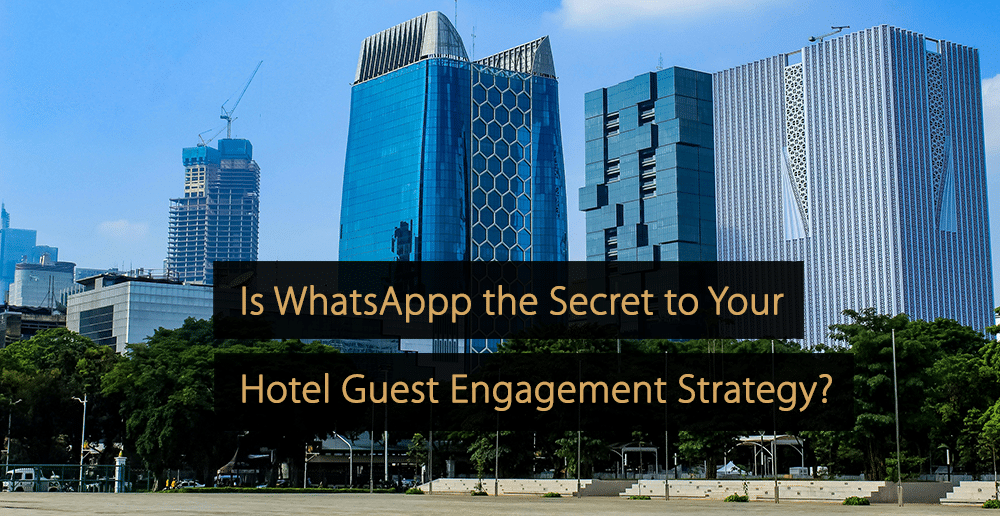WhatsApp isn’t just a guest messaging tool. It is a faster, more personal way to connect with guests across their journey. Hotels are using it to boost check-in rates, improve service touchpoints, and even increase on-site sales.
In this guide, you’ll learn when WhatsApp works best compared to email and SMS, what it costs, and how to build a smart communication mix that enhances the guest experience and overall performance.
Why Consider WhatsApp for Hotel Guest Communication At All?
For growing hotel brands, guest communication quickly becomes complex. More properties mean more touchpoints and more data, but also more chances to miss the right moment to engage. That’s where instant messaging can make a measurable difference.
WhatsApp offers more than just speed. It’s familiar, trusted, and already part of your guests’ daily routines. Guests rely on it to get answers instantly, so extending that same convenience through your hotel’s communication builds trust and responsiveness.
But adopting WhatsApp doesn’t mean relying on a single channel. The goal is to use the right channel for the right purpose. The key to success lies in the balance, supported by a CRM that helps automate, personalize, and track every message efficiently.
WhatsApp vs. Email vs. SMS — Which Works Best for Hotels?
Each channel plays a specific role in your guest journey, and using them strategically can have a direct impact on engagement, satisfaction, and even on-site spend.
- Email: Best for formal, information-heavy communication (e.g., booking confirmations, receipts, trip summaries). Email is also used for things that have no expiration date.
- SMS: Ideal for urgent, time-sensitive updates (e.g., WiFi codes, room access info, last-minute changes).
- WhatsApp: Suited for conversational, real-time engagement, such as interacting with guests, responding quickly, driving on-site offers, and providing service.
Want to optimize your hotel’s email channel too? Read our guide on 6 tips to fix your hotel’s email marketing and increase conversions.
Common Use Cases for WhatsApp (That Actually Work)
Many properties use WhatsApp as a way to send confirmation messages, but there are unlimited possibilities when it comes to using WhatsApp for hotel guest communication.
This is how some of our customers are using it:
1. Online Check-in Reminders
The team at Capsule Hotel needed to increase online check-in rates, and the email wasn’t reaching people on time. They switched this communication to WhatsApp, and the numbers started to skyrocket since it was a more timely way of reaching guests.
2. “Is Everything Okay?” Message
The team at Gambino Hotel in Germany added this touchpoint using WhatsApp as a more familiar and instant way of reaching guests and showing they care about their experience.
The message is triggered automatically, a few minutes after check-in has been completed.
3. Boosting Sales On-Site
The Usual, with properties in the Netherlands and Belgium, uses WhatsApp as a way to increase sales of items that are not as popular.
While no one would be reading their emails while on vacation, people do check their phones, and an offer of drinks at the bar or a discount for dinner at the hotel restaurant performs better than via email.
Again, all these messages are automatically sent to guests at different points of their stay, based on the guest journeys the team built with Bookboost.
A Faster Way to Communicate with the Front Desk
Guests have questions, and they don’t want to have to call reception or, worse, have to go downstairs to the lobby to get answers.
According to Jakob Lindh, Head of E-commerce at Nobis, WhatsApp works perfectly to address concerns and questions from guests once they are on the property.
Only 12% of hotels leverage WhatsApp in their marketing strategy. Could this be a missed opportunity? Discover the full picture in our latest data-driven hospitality report.
WhatsApp Pricing for Hotels: What to Expect
This is one of the main questions properties considering implementing WhatsApp have. Is the cost of WhatsApp for hotel guest communication worth it?
Let’s split your WhatsApp messages into two aspects: the ones you receive and the ones you send.
1. Messages You Receive
When guests contact you via WhatsApp, you have a 24-hour window to answer messages for free. Some platforms, like Bookboost, will show you how many hours you have left to answer those messages to avoid incurring unwanted costs.
2. Messages You Send (You Are the One Starting the Conversation)
The price will vary depending on whether it’s a marketing campaign or a utility campaign. It will also depend on the country you are sending messages to.
When using WhatsApp, it is key to have a tool that gives you access to templates, analytics, and automation to help you make the most out of this channel.
Looking to stay ahead of the latest trends in guest communication? Don’t miss our article on 6 digital marketing trends for hotels in 2025.
What About Guests Who Don’t Use WhatsApp?
Although WhatsApp is popular worldwide, it is possible to find people who prefer other channels. This will depend on the demographics of your guests.
However, it doesn’t have to be a deal breaker.
Bookboost offers the possibility of having a backup channel, which means if the guest doesn’t have a WhatsApp number, an email, or an SMS, it can be sent instead of that message, allowing your guest journey to remain consistent and deliver value.
Is WhatsApp Spammy? How Can Hotels Avoid That?
One of the biggest concerns from hoteliers is around spam communications and how to avoid guests thinking their messages are scams.
The good news is you can stop worrying about it. When you use WhatsApp, your communications will come from a verified number, and it can even be the existing front desk numbers or landline numbers your hotel currently uses.
It’s Not About Using One Single Channel to Talk to Your Guests
Creating a successful guest communication strategy is not about choosing one channel and abandoning all the others. It’s about understanding your brand and your guests and choosing strategically.
Hotels that have succeeded with their guest communication and driven revenue out of it were experimenting with a mix of channels, depending on the purpose of the message, the guest preferences, and the costs involved for the property.
Now you have all the answers you need to understand more about the use of WhatsApp for hotel guest communication and why it is worth it to implement it into your property.
Truly understanding your guests starts with knowing who they are. You can learn more about how to segment them and personalize your communication here.
Free Guide: How to Personalize the Guest Journey
In this guide, “How to Personalize the Guest Journey”, you will discover the importance of having a guest journey, how it looks, and how you can personalize it according to the trends that guide the behaviors of the 2023 guests. You will also find recommendations on developing each stage of the journey.
Click here to download the Guide “How to Personalize the Guest Journey”.
Using WhatsApp in your hotel’s communication strategy can transform guest engagement. Apply the insights shared here to build stronger relationships, enhance satisfaction, and boost revenue through smarter, faster, and more personalized guest interactions across every stage of the journey.
More Tips to Grow Your Business
Revfine.com is the leading knowledge platform for the hospitality and travel industry. Professionals use our insights, strategies, and actionable tips to get inspired, optimize revenue, innovate processes, and improve customer experience.Explore expert advice on management, marketing, revenue management, operations, software, and technology in our dedicated Hotel, Hospitality, and Travel & Tourism categories.



Leave A Comment